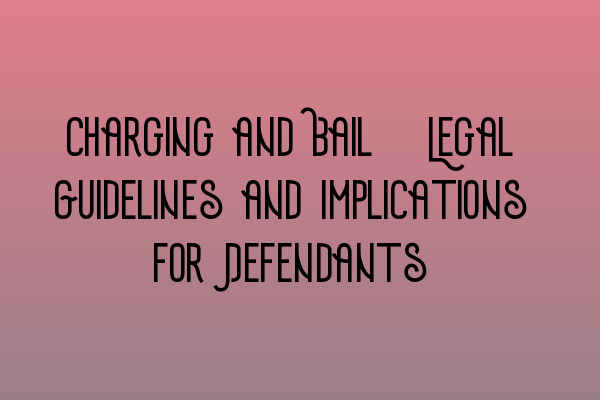Charging and Bail: Legal Guidelines and Implications for Defendants
When it comes to criminal cases, charging and bail are two important aspects that can significantly impact the course and outcome of a case. Understanding the legal guidelines and implications surrounding charging and bail is crucial for defendants and their legal representation. In this article, we will delve into the key considerations and provide valuable insights into the charging and bail process in the UK.
The Charging Process
Charging is the formal process of accusing an individual of committing a crime. It is initiated by the police or other law enforcement agencies after they gather evidence to support the suspicion of criminal activity. The decision to charge an individual is based on the Crown Prosecution Service’s (CPS) Code for Crown Prosecutors, which sets out the legal tests and evidential requirements for charging.
Once an individual has been charged, they will receive a Charge Sheet detailing the allegations against them. It is crucial to seek legal advice at this stage to understand the charges and possible consequences. The defence solicitor will carefully review the evidence and advise on the next steps, including plea options, potential defences, and the strength of the prosecution’s case.
Related Article: Workshops and Seminars on Criminal Practice: Expanding Your Expertise
Bail and its Implications
Bail refers to the temporary release of an accused person from custody pending trial. It allows the defendant to be released, subject to conditions, until their case reaches court. Bail is granted based on the principle that an individual is innocent until proven guilty.
When deciding on whether to grant bail or remand the defendant in custody, the court considers several factors, including:
- The seriousness of the offence
- The defendant’s criminal history
- The likelihood of the defendant fleeing or interfering with witnesses
- The potential risk to the public
It is important to note that not all defendants are automatically granted bail. In cases where the court deems the risk of absconding or interference with the course of justice too high, they may refuse bail and remand the defendant in custody until trial.
Related Article: Updates in UK Criminal Laws: Staying Informed and Prepared
Conditions of Bail
When bail is granted, the court imposes various conditions to ensure the defendant’s compliance and to address any potential risks. These conditions may include:
- Regular reporting to a police station
- Abstaining from certain activities or locations
- Surrendering travel documents
- Providing a surety or security
- Electronic monitoring
Failure to comply with these conditions can lead to the revocation of bail and the defendant being returned to custody.
Related Article: Enhancing Your SQE Criminal Law Study Group Experience
The Implications of Charging and Bail
The decisions made during the charging and bail process can have significant implications for defendants. Being charged with a criminal offence can have long-lasting consequences, including damage to reputation, potential employment issues, and impact on personal relationships. Therefore, it is vital for defendants to seek professional legal advice at the earliest stage.
Additionally, the outcome of bail hearings can dictate whether a defendant will spend the duration of their case in custody or be able to continue with their life while awaiting trial. Understanding the factors that influence the court’s decision and having a strong legal representation is crucial for those applying for bail.
Related Article: Decoding Criminal Evidence Rules: A Detailed Analysis
Conclusion
Charging and bail are critical steps in the criminal justice process that can significantly impact defendants. Understanding the legal guidelines and implications surrounding these aspects is crucial for defendants and their legal representatives. Seeking professional advice, understanding the charges, and complying with bail conditions are essential steps for defendants to navigate the criminal justice system effectively.
To stay informed about the latest updates and developments in criminal laws, check out our SQE Criminal Law & Practice Law UK website.
Related Article: Deep Dive into Fraud and Financial Crimes in the UK
